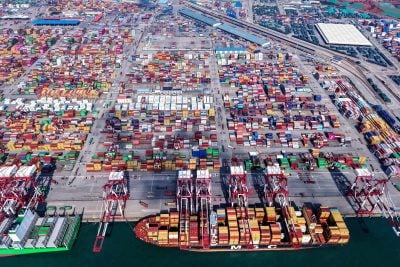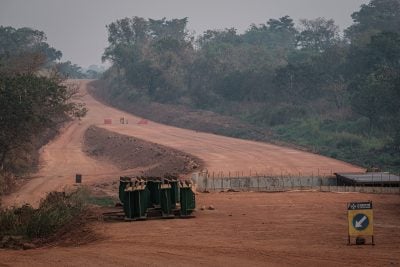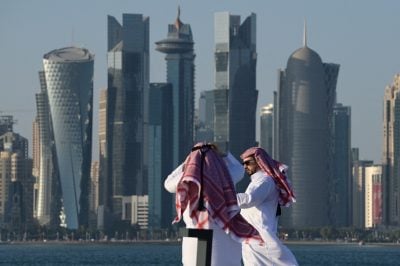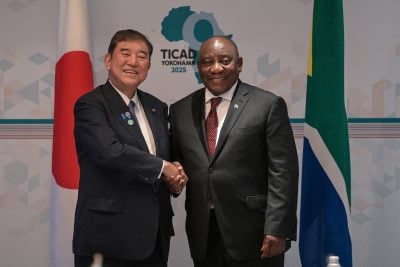As director general of the World Trade Organisation (WTO), Pascal Lamy found himself at the front line of globalisation, which for him has had the extremely positive effect of reducing poverty, even as he recognises that it has created greater inequality.
He believes countries that have opened up to trade have fared better in terms of growth and development than others, and he disagrees with the assertion that we are approaching the limits of the current system. Globalisation, he argues, is just another form of capitalism, whose ability to create efficiencies and reduce poverty is well known.
But these benefits come at the expense of destructive and creative processes – “it works because it’s painful and it’s painful because it works.” He can’t see a crisis of globalisation that isn’t a crisis of capitalism, and capitalism is in a permanent state of crisis, always re-inventing itself.
The problem is with distribution of the benefits of the greater efficiencies, which is more acute than it was 20 years ago. But we cannot reverse these effects by closing down trade, he says. The problem is one of social policy, of local consensus over taxation and social security – social issues not very different from those we faced in the nineteenth century.
What he does think needs to be improved are global systems of governance. Regulation of international relations and the organisation of global cities can no longer rely on nation states alone, but must also involve NGOs, multinational businesses, governments and cities. In this exclusive interview he sets out his views on globalisation in light of current economic and geopolitical developments as well as charting Africa’s progress in terms of trade, integration and where it needs to seek its competitive advantage.
How does this new multipolar order, with the emergence of China and other countries, change the playing field?
Fundamentally! The world is undergoing two profound upheavals. The first is related to technology. The second is related to what Jean-Michel Severino has called “the great transformation”: there are currently 2bn people in the world who belong to the middle class, most of them in the West. In 2030 there will be a billion more in Asia and another billion shared between Africa and Latin America.
We are also seeing the balance shifting in a world that has been Western for about 20 centuries – mostly for political reasons – because China, for four centuries, had decided to shut itself off and withdraw from the world. In 1979, Deng Xiaoping decided that it was time to put an end to this huge mistake.
What sort of soft power will the new multi-polar world rely on?
We must have closer international cooperation to overcome preoccupations with sovereignty and nationalism, while remaining aware that the world must preserve diversity because it contains diverse identities. The economists, sociologists and philosophers have clearly demonstrated that globalisation does not mean uniformity. Jeans are not worn the same way in Saigon as in Sao Paulo! A McDonalds meal is not eaten the same way in Shanghai as in Cape Town! It’s still the same McDonalds, but the people who go there, the reasons why they go there, and what they do there, are different.
The world must remain diverse, but it also needs more convergence on a certain number of major issues. This brings with it some substantial problems: until now, we have been able to live in distinct value systems – it was not a big issue – but this era is coming to an end. We will have to accept the convergence of values on some very major issues – issues that are ethically very, very substantial: life, death … Buddhists, Catholics, Muslims and atheists will have to sit down together; something that they have not had to do in the past.
And will Africa be able to take a seat at that table?
Africa must have a seat! It’s the biggest unknown factor for the world 20 years from now. In 2050, Africa will have a population of 2bn out of the 8 or 9bn for the planet as a whole. Africa will be the biggest question of the 21st century.
We all know that over the last four or five decades, Africa has struggled to transform itself. It’s an issue that cannot be divorced from that of development and it will become increasingly pressing as demographic growth continues. In 20 years it will no longer be possible to say that what happens in Africa does not matter, something that we still hear even now and was also said about China 50 years ago.
The world’s destiny – the good and the not so good things, war, peace, growth, development, employment – will be far more dependent on what happens in Africa. Africa will be too important to be left out, whether things are going well or not. From that point of view, I am more on the side of the Afro-optimists than the Afro-pessimists.
The forces at work are pushing in the right direction, starting with entrepreneurship: I see an absolutely fantastic entrepreneurial dynamic that is growing and blooming. Moreover, regional integration is progressing, not uniformly, admittedly. Things are going well in East Africa, a little less well in Central Africa, and moderately well in West and Southern Africa – but the process will, in the end, provide solutions for most of what is negative about the colonial legacy. I am thinking especially of the question of borders.
This fragmentation is the number one problem facing Africa. And nothing is being done, except wishful thinking, to change the model. I don’t agree. The East African Community is working. There is rapid integration with a consistency of policy that goes beyond regime change – where there is regime change – which, I admit is not the case everywhere.
It’s a little less true in West and Southern Africa. In Central Africa, it’s not working for reasons specific to the difficulties inherent in the region, but, yes, regional integration is underway! It will happen sooner or later.
The sooner the better, because the continent is indeed a victim of this colonial legacy that it has itself, unfortunately, further reinforced, because independence was achieved in the name of what was fashionable at the time, namely nationalism. Unluckily, Africans have inoculated, re-inoculated themselves, after being infected with a disease known as borders. It’s a shame!
Could Africa allow itself a generational leap in terms of development? Meaning skipping certain stages?
That’s exactly what’s happening already! We’ve seen it in ECOWAS and it will also occur elsewhere. This idea that Africa has no right to develop without first going through a phase of industrialisation like the Western world is, in my opinion, absurd. Just look at the number of African entrepreneurs who are embarking on projects all over the continent. Especially in the service sector.
But we all know that most African countries cannot move forward without a backbone of the economy. The Economic Commission for Africa (ECA) is calling for the industrialisation of Africa. I disagree with Carlos Lopes on that point. I believe it to be an outdated vision of economic development. It is the vision of the 1950s that consists of import substitution, in the belief that if there are no big, smoky factories, then it can’t be a real country … I don’t agree with it!
What is the comparative advantage of Africa?
From an economic point of view, it is the same as everywhere else in the world: brains! Yes, but illiteracy currently remains a big, not to say a major, problem in Africa. No. There has never been less illiteracy than today! Never!
Illiteracy is gradually decreasing. In a few decades, the world’s biggest source of raw materials will be brainpower. And by then, Africa will have two and a half billion individuals. That is the comparative advantage! If you put it like that, there’s fierce competition for brains and grey matter[…] of course, lots of Africans leave Africa. But a lot of them return! Look at the number of management staff in African banks who have been trained in Europe or the United States and have come back to work in Africa! No, really, on that point, I am not at all pessimistic.
Once again, I am not saying that everything is perfect, but I believe that there is a positive trend overall. And above all, I believe that Africans are themselves rethinking Africa! There is an entire movement of thought that consists of “Africanising Africa”, in its thinking and philosophy, to make of it something other than a sort of clone of the western world.
You are talking about high stakes – Africa really is the new frontier – there is a risk that the continent could become the battleground for geopolitical rivalries. You can see it with China, Russia, and others[…] I don’t think so. I think that time is over. That was true during the Cold War, but it’s no longer the case today.
So you believe that there is no competition?
Africa now has a sufficient level of political and economic organisation for it not to be exploited by China, Russia, or the United States. I’m talking about interests… Ah, but interests are interests… Everybody knows that the Chinese need raw materials and that there are raw materials in Africa!
But the Indians and the Chinese will be in competition, mainly because the Indians on the east coast of Africa occupy a historic position that the Chinese do not have. That is precisely the reason why the Europeans are going to have to be more active in Africa, their southern border. On the other hand, I don’t think that the Americans have any particular date with destiny in Africa …
You have held various positions that have placed you at the heart of some vital issues. What motivates you to take action today?
I simply try to implement my ideas, and the values I believe in, anywhere where I think I can be the most useful. That is why I have stayed on as strategic advisor to the Trademark East Africa organisation that works on an everyday basis to find practical solutions to regional integration: harmonisation of border controls, the creation of parking facilities suitable for trucks and buses. Along with Donald Kaberuka, we have just published a report that proposes a review of the criteria for the allocation of development aid in the field of healthcare. Development aid is badly in need of reform to adapt to new needs.
The tools are not always the best suited[…] That’s true, I agree. And that is inevitable insofar as development aid consists of connecting solutions created in rich countries to the ecosystem in poor countries.
The problem is that the two have the greatest difficulty in functioning together, because the government of a rich country that wants to devote 0.7% of its GDP to development aid has to justify itself to its own parliament, and because the people in that parliament have nothing in common with the way of thinking of the people for whom the aid is intended, whether in Africa or elsewhere.
Development aid has changed, and it needs to continue to do so, particularly by taking a greater interest in education, which is a major challenge. Even if education cannot be dissociated from healthcare, for example.
Hichem Ben Yaïche
Want to continue reading? Subscribe today.
You've read all your free articles for this month! Subscribe now to enjoy full access to our content.
Digital Monthly
£8.00 / month
Receive full unlimited access to our articles, opinions, podcasts and more.
Digital Yearly
£70.00 / year
Our best value offer - save £26 and gain access to all of our digital content for an entire year!

 Sign in with Google
Sign in with Google 




